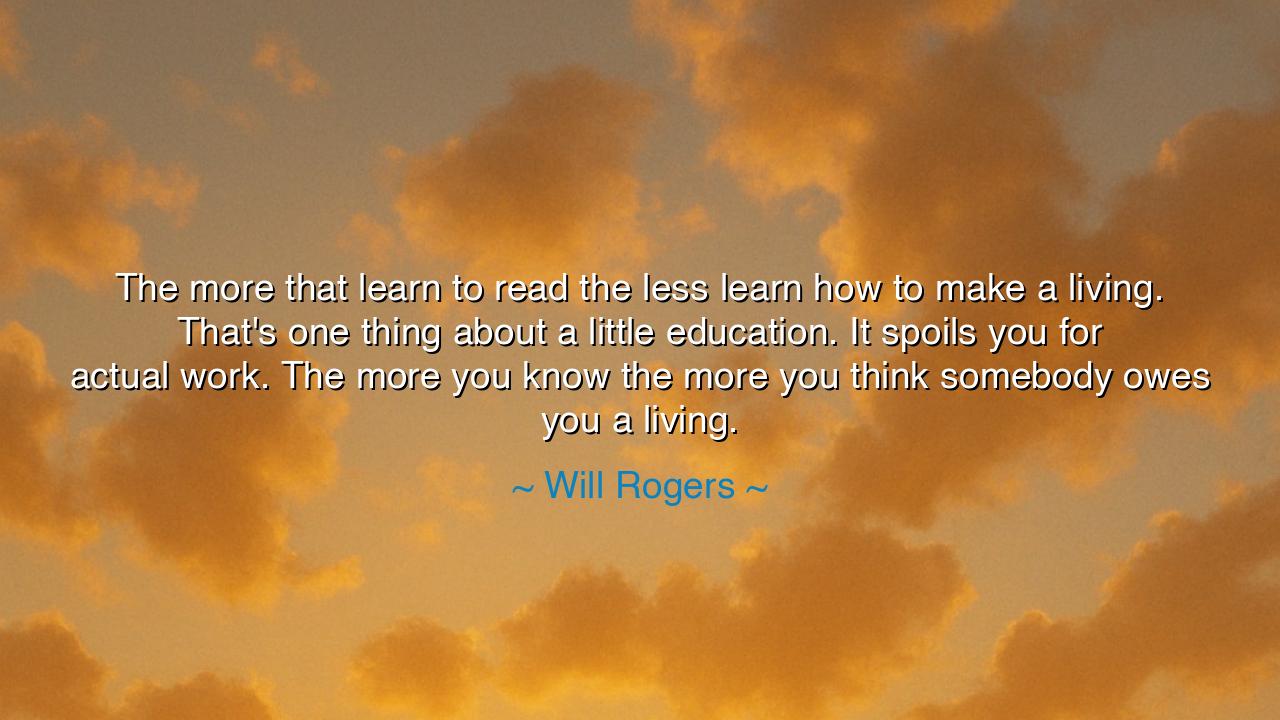
The more that learn to read the less learn how to make a living.
The more that learn to read the less learn how to make a living. That's one thing about a little education. It spoils you for actual work. The more you know the more you think somebody owes you a living.






“The more that learn to read the less learn how to make a living. That's one thing about a little education. It spoils you for actual work. The more you know the more you think somebody owes you a living.” Thus spoke Will Rogers, the cowboy philosopher, who clothed truth in humor and laughter yet struck at the heart of human folly. His words are a warning wrapped in wit: that when education is shallow, half-formed, and not joined with discipline, it can breed arrogance instead of wisdom, entitlement instead of effort.
The meaning of this saying is that learning, when not rooted in humility and hard work, can become a stumbling block rather than a foundation. A person with “a little education” may feel superior to labor, imagining themselves above sweat, toil, and craft. Instead of building skill, they rest in pride. Instead of learning how to live, they imagine the world owes them comfort because they carry the faint shine of knowledge. Rogers warns us that true education must not divorce itself from the practical, for without work, learning becomes vanity.
The ancients themselves saw this truth. Socrates despised sophists who sold clever words but bore no fruit in virtue or labor. The Stoics taught that philosophy is worthless unless it can be lived in the marketplace, the workshop, and the battlefield. To read and learn is noble, but if such learning does not prepare one to serve, to create, or to endure, then it is hollow. Rogers echoes this ancient wisdom in his rustic tongue: reading without practice can spoil the soul for actual work.
History provides us with examples. In the last days of the Qing Dynasty in China, officials often prized scholars who had mastered classical texts but knew little of the modern world. They could recite ancient poetry but could not build railroads, govern armies, or manage industry. Thus, when foreign powers pressed upon the empire, the educated elite proved powerless, their “little education” making them haughty, yet useless in crisis. Meanwhile, nations that wed learning to industry, like Japan, surged forward. This is the very danger Rogers mocked: knowing much in theory, but little in living.
Yet his words should not be twisted into disdain for education itself. Rogers was not condemning knowledge but the misuse of it—the kind of pride that grows from fragments of wisdom untested by labor. True education, when full and humble, joins mind and hand together. It teaches not only how to think but how to live. It breeds not entitlement, but responsibility; not pride, but service. The fault lies not in knowledge, but in the heart that treats knowledge as an excuse to avoid toil.
The lesson for us is clear: let your learning deepen, not shallow. Do not be content with reading alone—marry your studies with practice. If you learn philosophy, live it. If you study economics, use it to build and serve. If you gain wisdom, let it make you more diligent, not less. And above all, guard against the thought that the world owes you a living. Life owes us nothing; we owe life our labor, our honesty, and our contribution.
So let Rogers’ words be remembered as both jest and prophecy: “The more you know the more you think somebody owes you a living.” Laugh at the humor, but hear the warning. Seek education that humbles, not inflates. Seek work that strengthens, not weakens. And let your knowledge serve as a tool, not as a crown. For the union of mind and labor is the path of wisdom, but the separation of the two is the road to ruin. In this balance lies the dignity of life, the strength of nations, and the honor of the soul.






AAdministratorAdministrator
Welcome, honored guests. Please leave a comment, we will respond soon